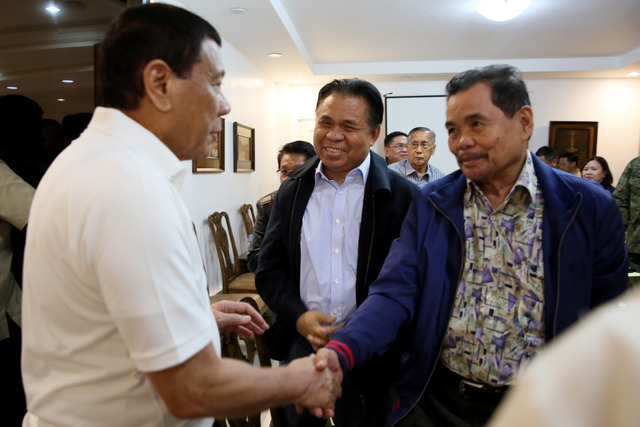MINDANAO PEACE. President Rodrigo Duterte shakes hands with Moro Islamic Liberation Front (MILF) peace panel chairman Mohagher Iqbal. Malacañang file photo
MANILA, Philippines – Malacañang released the Bangsamoro Organic Law (BOL) or Republic Act Number 11054 a day after President Rodrigo Duterte signed it.
The law is historic as it means the Duterte administration has surpassed the previous administration in fulfilling its promise to create a new Bangsamoro region in place of the Autonomous Region in Muslim Mindanao (ARMM).
Passing the BOL is also a fulfillment of a major campaign promise by Duterte, the first president from Mindanao. It's the culmination of a peace deal signed between the Moro Islamic Liberation Front and past administrations.
The BOL retains the major provisions agreed upon during the long and arduous bicameral conference between the Senate and House of Representatives.
They are the following:
Composition: The region would be composed of the current ARMM – Tawi-Tawi, Sulu, Basilan, Maguindanao, and Lanao del Sur – pending a regional plebiscite.
Also included in the Bangsamoro region are 6 municipalities of Lanao del Norte and 39 barangays of Cotabato, provided that the province and their municipalities, respectively, vote to lose jurisdiction over them. These areas previously voted to be included in the ARMM, but their mother units voted against it. (READ: Duterte ends BBL impasse: Mother LGUs' vote needed for inclusion in Bangsamoro)
The chartered cities of Cotabato and Isabela would also be included, subject to the approval of their respective registered voters in the plebiscite.
The law has an opt-in provision, allowing areas adjacent to the region to join the Bangsamoro, with a petition of at least 10% of their voters.
Wealth sharing: The law grants 75-25 wealth sharing between the Bangsamoro and national governments – higher than the current 70-30 scheme under the ARMM law. This means 75% of the national internal revenue collection would go to the Bangsamoro, and 25% to the central government.
Block grant: An annual block grant, pegged at a 5% share of the national internal revenue or some P59 billion, would also be automatically appropriated to the region without any conditions.
Head of government: The Bangsamoro government will be headed by a chief minister and a ceremonial leader called a Wali.
Parliament: There will be a parliament composed of 80 members: 50% party representatives, 40% district representatives, and 10% sectoral representatives, including two reserved seats for "non-Moro indigenous peoples and settler communities."
Security: The Bangsamoro will not have its own military and police forces, as these would still be under the national government. (READ: Bicam adopts Senate provision vs Bangsamoro firearms purchase)
Supervision over bodies of water: The Bangsamoro region will primarily oversee all inland bodies of water, except for those that produce energy for other areas outside its jurisdiction. Energy-producing bodies of water, like Lake Lanao, would instead be co-managed by the region together with the Department of Energy.
https://www.rappler.com/nation/208331-document-bangsamoro-organic-law


No comments:
Post a Comment
Note: Only a member of this blog may post a comment.